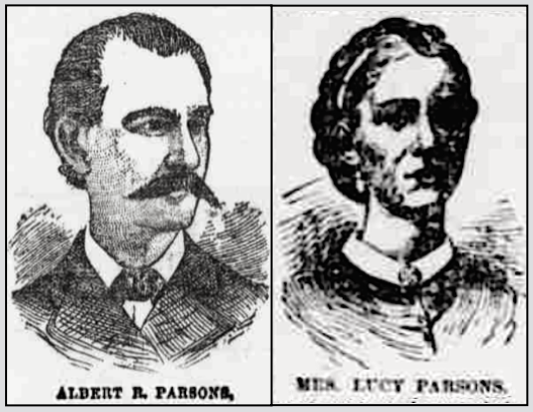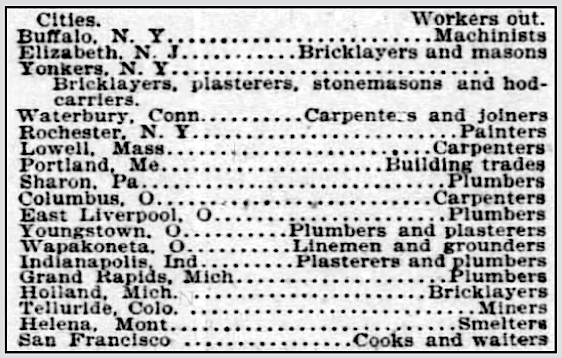 —————
—————
Hellraisers Journal Thursday May 2, 1901
Fifteen Years Since May Day 1886, Nation’s Workers Strike for Eight-Hour Day
Albert and Lucy Parsons, Leaders in Chicago during
1886 Nationwide May Day Strike for Eight-Hour Day:
From The Chicago Daily Tribune of May 2, 1901:
WORKERS STRIKE IN MANY CITIES.
———-
May Day Marked by Walkout of
Union Men of Varied Crafts.
—–EIGHT-HOUR DAY ASKED.
———-
Building Trades Most Affected, the Employes
Demanding Increases in Pay.
—–BIG PLAN OF MACHINISTS.
—–May day strikes of union workers in all parts of the country were numerous, yesterday, although there was no general walkout in any line of skilled labor. In nearly all cases the points at issue were local differences respecting hours or wages. The eight-hour and Saturday half holiday movements showed gains in strength, many unions insisting that the shorter day be granted at once. The one strike most menacing is that of the machinists at Buffalo, N. Y., where a 9-hour day with no decrease in pay was demanded. It is claimed that this fight will be taken up by the local organizations throughout the United States, Canada. and Mexico, and that a general walkout is likely on May 20.
Building Trades Most Affected.
Building trades are most affected by the strikes, carpenters, plumbers, plasterers, bricklayers, masons, and others in kindred lines in many cities making demands that their employers think too great. Their requests varied among increases in pay, shorter hours, reduction in the number of apprentices, and recognition of the union.
The cases where the employers acceded to the requests of the workers after a strike was declared were not numerous, although many granted all asked or reached a satisfactory compromise before the day fixed for a settlement arrived.
At Bridgeport, Conn., the master builders have acceded to the demand of the carpenters, bricklayers, plasterers, and stone masons for an eight-hour workday, the carpenters to be paid 35 cents an hour and the others 45 cents.
Some of the more important strikes inaugurated yesterday were the following:
Many Demand Eight-Hour Day.
In the above strikes the eight-hour day is the chief issue in Waterbury, Conn., Rochester, N. Y., Lowell, Mass., Columbus, O., and Youngstown, O.
Twenty-two hundred union cooks and waiters in San Francisco struck because Restaurant Keepers’ association would not sign the union agreement for shorter hours and increased wages.
The bricklayers at work on a big factory in Holland, Mich., based their demands for an increase in pay on the report that two men brought from Grand Rapids were paid 50 cents a day more than others in the same trades.
[Emphasis adde.]
~~~~~~~~~~~~~~~~~~~~~~
SOURCES
Quote Albert Parsons, Chicago, Nov 11, Alarm p1, Nov 19, 1887
https://www.worldcat.org/title/alarm/oclc/10478576
Note: article reprinted in full here:
The Agitator of Nov 15, 1911, page 1
“Day of Martyrdom” from The Alarm of Nov 19, 1887
https://www.marxists.org/history/usa/pubs/agitator/v2n01-nov-15-1911-agitator.pdf
The Chicago Daily Tribune
(Chicago, Illinois)
-May 2, 1901
https://www.newspapers.com/image/350236712/
IMAGES
Albert and Lucy Parsons,
Essex County Herald p1, Nov 18, 1887
https://chroniclingamerica.loc.gov/lccn/sn84023416/1887-11-18/ed-1/seq-1/
Rock Island Daily Argus p2, Mar 10, 1887
https://chroniclingamerica.loc.gov/lccn/sn92053945/1887-03-10/ed-1/seq-2/
See also:
“The Eight-Hour Strike of 1886” by Lucy Parsons
https://theanarchistlibrary.org/library/lucy-e-parsons-the-eight-hour-strike-of-1886
From Industrial Worker p6, May 1, 1912
https://www.marxists.org/history/usa/pubs/industrialworker/iw/v4n06-w162-may-01-1912-IW.pdf
May Day Strike of 1886
https://ohiohistorycentral.org/w/May_Day_Strike_of_1886
Tag: Eight-Hour Day
https://weneverforget.org/tag/eight-hour-day/
“Eight Hours” (Song)
Words by I. G. Blanchard; music by Rev. Jesse H. Jones
Originally published in 1878
Reprinted in American Labor Songs of the Nineteenth Century, 1975
-ed by Philip S. Foner
https://www.encyclopedia.com/history/encyclopedias-almanacs-transcripts-and-maps/eight-hours
https://books.google.com/books?id=fS28zQEACAAJ
Report, Volume 18
Michigan Bureau of Labor, 1901
(Note: this source states “Eight Hours” first pubd in 1873.)
https://books.google.com/books?id=Qc0zAQAAMAAJ
https://play.google.com/books/reader?id=Qc0zAQAAMAAJ&hl=en&pg=GBS.PA256
~~~~~~~~~~~~~~~~~~~~~~~~~~~~~~~~~~~~~
Eight Hours – Cincinnati’s University Singers
Lyrics by I. G. Blanchard, Music by Rev Jesse H. Jones
We mean to make things over, we’re tired of toil for naught,
But bare enough to live on, never an hour for thought;
We want to feel the sunshine, we want to smell the flowers,
We’re sure that God has willed it, and we mean to have eight hours;
We’re summoning our forces from shipyard, shop, and mill,
Eight hours for work, eight hours for rest, eight hours for what we will.
The beasts that graze the hillside, the birds that wander free,
In the life that God has meted, have a better lot than we;
Oh, hands and hearts are weary and homes are heavy with dole,
If life’s to be filled with drudgery, what need a human soul.
Shout! Shout! the lusty rally from shipyard, shop, and mill,
The very stones would cry out if labor’s tongue were still.
The voice of God within, is calling us to stand
Erect, as is becoming the work of His right hand;
Should he whom the Maker, His glorious image gave,
Cower, the meanest of His creatures, a bread and butter slave;
Let the shout ring down the valley and echo from every hill,
Eight hours for work, eight hours for rest, eight hours for what we will.


